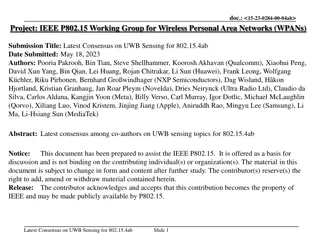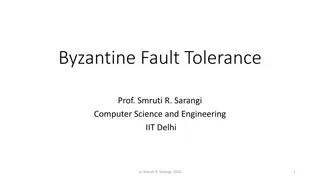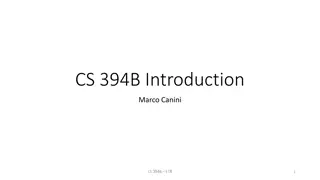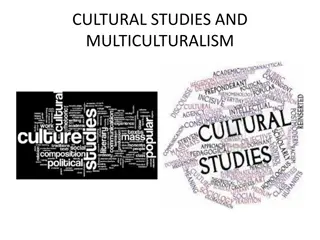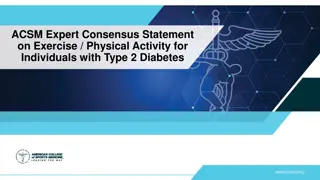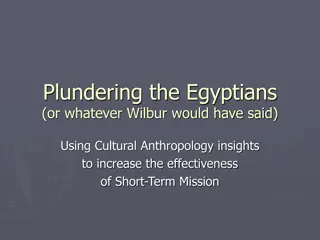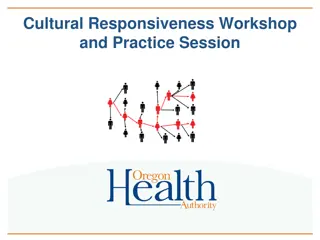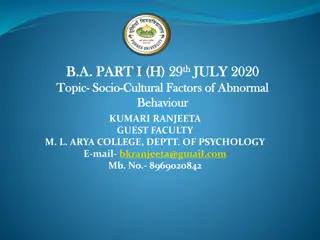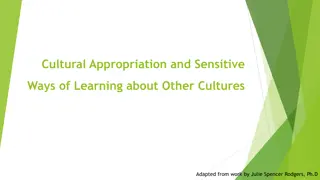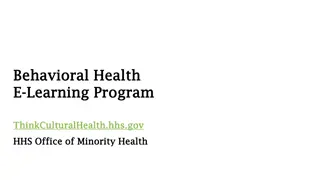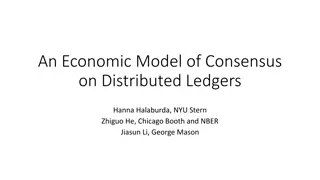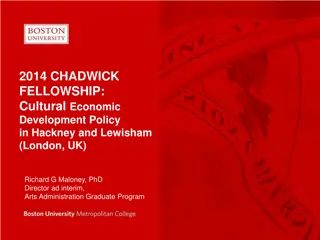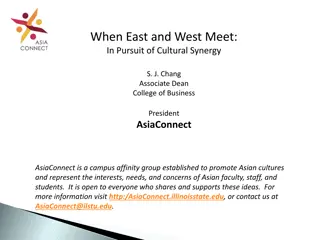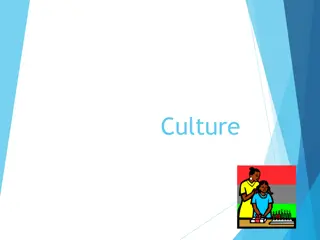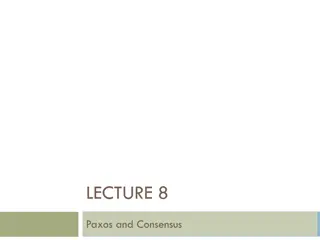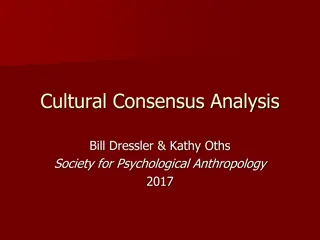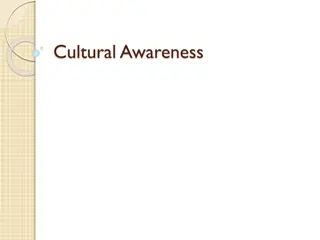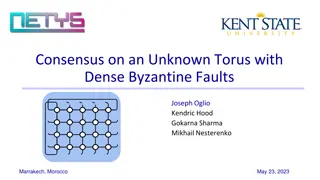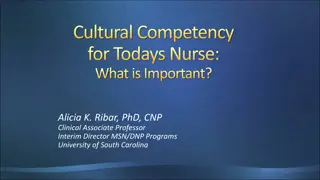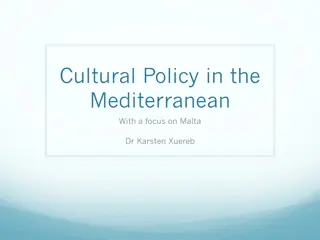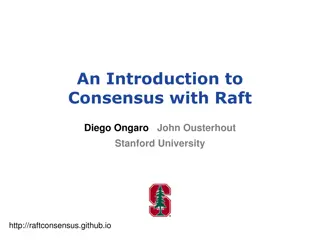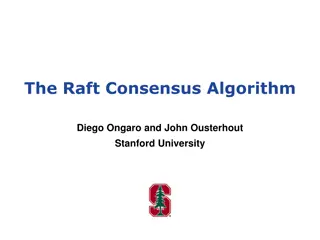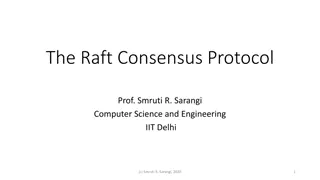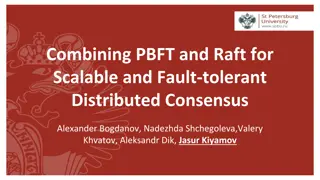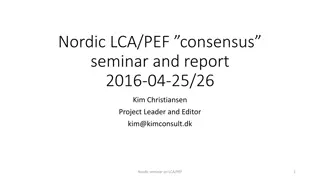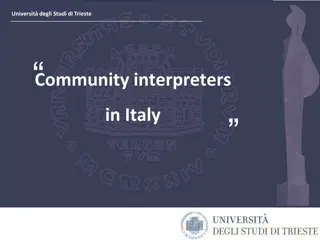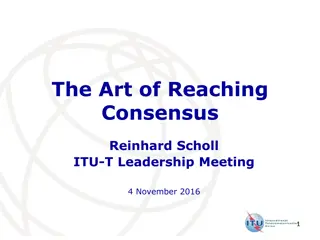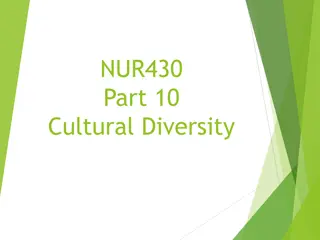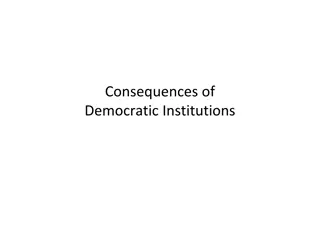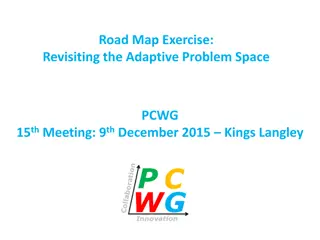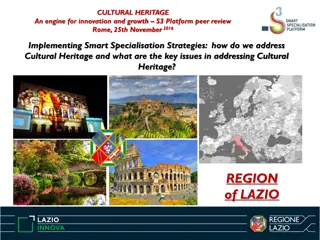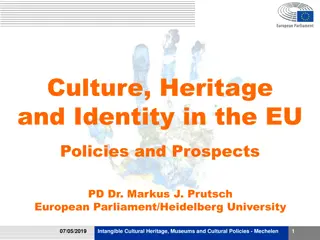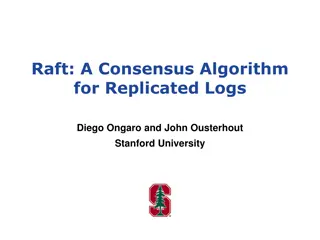Latest Consensus on UWB Sensing for 802.15.4ab
Co-authors from various companies present the latest agreement on ultra-wideband (UWB) sensing topics for the IEEE 802.15.4ab standard. The consensus includes definitions for sensing pulse shape, packet formats for bi/multi-static sensing, and support for specific sequences and patterns in UWB sensi
1 views • 27 slides
Understanding Byzantine Fault Tolerance in Distributed Systems
Byzantine fault tolerance is crucial in ensuring the reliability of distributed systems, especially in the presence of malicious nodes. This concept deals with normal faults, crash faults, and the challenging Byzantine faults, where nodes can exhibit deceptive behaviors. The Byzantine Generals Probl
0 views • 29 slides
Understanding CS 394B: Blockchain Systems and Distributed Consensus
This course, led by Assistant Professor Marco Canini, delves into the technical aspects of blockchain technologies, distributed consensus, and secure software engineering. Students will engage in flipped classroom-style classes and paper presentations, critiquing research papers, defending research
0 views • 65 slides
Exploring Cultural Studies and Multiculturalism
Cultural studies is an interdisciplinary field that examines cultural differences while aiming to create a shared culture where diversity is respected. It challenges traditional views by studying all cultural productions and their societal contexts. Stuart Hall's work further delves into different p
0 views • 18 slides
Expert Consensus Statement on Exercise for Type 2 Diabetes
This expert consensus statement provides an update on exercise recommendations for individuals with type 2 diabetes (T2D), emphasizing the benefits of physical activity in improving glycemic management, insulin sensitivity, cardiovascular health, and overall disease risk reduction. The document high
0 views • 16 slides
Enhancing Short-Term Mission Effectiveness Through Cultural Anthropology Insights
Utilizing insights from cultural anthropology, this presentation delves into defining culture for short-term missions, viewing culture in successive levels, and key concepts such as cultural evolution and relativity. It explores the impact of culture on individuals and missions, emphasizing the impo
0 views • 16 slides
Exploring Cultural Responsiveness Through Workshops & Practice Sessions
This content provides a comprehensive guide on cultural responsiveness through workshops and practice sessions. It covers topics like cultural sensitivity, biases identification, and ways to reduce implicit biases. Resources, videos, and insights on cultural knowledge and awareness are shared to pro
0 views • 19 slides
Critics and Defenders in Multiculturalism Debate
Critics of multiculturalism argue that its focus on cultural inequalities diverts attention from socio-economic issues, while defenders like Kymlicka advocate for balancing cultural recognition with equal rights. Feminist critics raise concerns about cultural support for individual self-respect, par
0 views • 9 slides
Understanding Socio-Cultural Factors of Abnormal Behavior in Psychology
Exploring the impact of socio-cultural factors on abnormal behavior, this article delves into the influence of societal pressures, cultural norms, and economic status on mental health. The socio-cultural model emphasizes how societal criteria shape perceptions of abnormality, highlighting the role o
0 views • 7 slides
Understanding Cultural Appropriation and Respectful Cultural Learning
This content delves into the concept of cultural appropriation, offering definitions, examples, and ways to avoid it. It emphasizes the importance of cultural appreciation and outlines the differences between appropriation and appreciation, highlighting the power dynamics involved. Readers gain insi
1 views • 16 slides
Enhancing Cultural Competency in Behavioral Health Professionals
This e-learning program, developed by the HHS Office of Minority Health, focuses on improving cultural competence for behavioral health providers. It covers topics such as the connection between culture and behavioral health, the impact of cultural identity on client interactions, and strategies to
0 views • 9 slides
Louisiana Cultural Districts: Engaging Communities in Cultural Development
The Louisiana Cultural Districts program, under the Cultural Economy Initiative, aims to revitalize local communities by creating hubs of cultural activity. By building on cultural resources and promoting art and culture, the program benefits from increased occupancy, commerce, and community identit
2 views • 18 slides
Economic Models of Consensus on Distributed Ledgers in Blockchain Technology
This study delves into Byzantine Fault Tolerance (BFT) protocols in the realm of distributed ledgers, exploring the complexities of achieving consensus in trusted adversarial environments. The research examines the classic problem in computer science where distributed nodes communicate to reach agre
0 views • 34 slides
Distributed Consensus Models in Blockchain Networks
Economic and technical aspects of Byzantine Fault Tolerance (BFT) protocols for achieving consensus in distributed ledger systems are explored. The discussion delves into the challenges of maintaining trust in adversarial environments and the strategies employed by non-Byzantine nodes to mitigate un
0 views • 34 slides
Cultural Economic Development Policy in Hackney and Lewisham: A Comparative Study
Building on previous research in Massachusetts, this project focuses on examining local government initiatives in cultural economic development in London boroughs of Lewisham and Hackney. The study explores the role of government in enhancing the cultural and creative industries, aiming to contribut
0 views • 7 slides
Bridging East and West: Cultivating Cultural Understanding
Exploring the complexities and nuances of cultural differences between the East and the West, this article delves into the challenges of cultural synergy and the importance of fostering multicultural understanding. Highlighting the need for effective communication and empathy across cultures, it pre
0 views • 18 slides
Understanding Cultural Diversity in Healthcare
The content explores the significance of cultural diversity in healthcare, emphasizing the increasing diversity of the population in the United States and the importance of cultural competence in nursing. It delves into cultural concepts, transcultural nursing, cultural context of health and caring,
0 views • 13 slides
Understanding Paxos and Consensus in Distributed Systems
This lecture covers the concept of Paxos and achieving consensus in distributed systems. It discusses the availability of P/B-based RSM, RSM via consensus, the context for today's lecture, and desirable properties of solutions. The analogy of the US Senate passing laws is used to explain the need fo
0 views • 46 slides
Understanding Cultural Consensus Analysis in Psychological Anthropology
Explore the essence of Cultural Consensus Analysis (CCA) as a significant aspect of psychological anthropology. Through ethnographic work and structured techniques, CCA helps verify shared knowledge within cultural domains and enhance the comprehension of cultural models. The model and steps involve
0 views • 64 slides
Understanding Consensus Algorithms in Paxos
Consensus algorithms play a vital role in distributed systems like Paxos. Paxos is a protocol that aims to achieve consensus among a majority of participants. It defines roles for nodes like proposers, acceptors, and learners, each serving a specific purpose in reaching agreement on a single value.
0 views • 24 slides
Understanding Cultural Awareness and Diversity in the United States
Explore the significance of cultural awareness, including definitions of culture, cultural groups, and subcultures. Learn about the diversity in the United States based on national origins, beliefs, customs, and shared characteristics. Discover how to interact positively with individuals from differ
0 views • 37 slides
Development and Application of Cultural Policy Typology for Arts and Culture
This research focuses on presenting a cultural policy typology based on goal variation and examining its application in a U.S. state art/cultural agency, specifically the Massachusetts Cultural Council. The study delves into the policy goals of the council and highlights the need for a specialized c
0 views • 16 slides
Byzantine Faults and Consensus on Unknown Torus
The discussion revolves around achieving consensus in the presence of dense Byzantine faults on an unknown torus. Various challenges and impossibility theorems are explored, highlighting the complexities of reaching an agreement in such fault-prone environments. The content delves into the limitatio
0 views • 23 slides
Understanding Cultural Competency in Nursing Today
Explore the importance of cultural competency for nurses today, encompassing the definition of culture, cultural competence, Leininger's Culture Care Theory, and the significance of cultural understanding in nursing. The presentation delves into the role of nurses in promoting health across diverse
0 views • 14 slides
Exploring Cultural Policy in the Mediterranean with a Focus on Malta
Delve into the intricate web of cultural relations in the Mediterranean region, centered around Malta. From historical and political insights to postcolonial influences and the role of cultural policy, this exploration sheds light on the complexities and nuances shaping the cultural landscape. Disco
0 views • 23 slides
An Introduction to Consensus with Raft: Overview and Importance
This document provides an insightful introduction to consensus with the Raft algorithm, explaining its key concepts, including distributed system availability versus consistency, the importance of eliminating single points of failure, the need for consensus in building consistent storage systems, an
0 views • 20 slides
The Raft Consensus Algorithm: Simplifying Distributed Consensus
Consensus in distributed systems involves getting multiple servers to agree on a state. The Raft Consensus Algorithm, designed by Diego Ongaro and John Ousterhout from Stanford University, aims to make achieving consensus easier compared to other algorithms like Paxos. Raft utilizes a leader-based a
0 views • 26 slides
Understanding the Raft Consensus Protocol
The Raft Consensus Protocol, introduced by Prof. Smruti R. Sarangi, offers a more understandable and easier-to-implement alternative to Paxos for reaching agreement in distributed systems. Key concepts include replicated state machine model, leader election, and safety properties ensuring data consi
0 views • 27 slides
Enhancing Distributed Consensus: Combining PBFT and Raft for Improved Security
Addressing challenges in distributed systems, this study proposes a novel approach by combining PBFT and Raft consensus mechanisms to enhance scalability and fault tolerance. The research highlights the importance of secure data storage and identifies new attack mechanisms in today's digital landsca
0 views • 11 slides
Comparison of Economic Reform Sequencing in China
Andrew K. Rose from NUS Business School compares China's economic reform sequencing with the Washington Consensus. The optimal reform sequencing includes stabilization before reform, real before financial reform, and domestic before international reform. China's approach aligns oddly with the Washin
0 views • 14 slides
Nordic LCA/PEF Consensus Seminar and Report 2016: Insights and Progress
Nordic Environmental Footprint Group (NEF) is a key Nordic authority cooperation group under the Nordic Council of Ministers dedicated to discussing and exchanging viewpoints on EU Commission testing and uses of Product and Organizational Environmental Footprint. Through workshops and seminars, NEF
0 views • 16 slides
Community Interpreting and Cultural Mediation in Italy: Insights from the University of Trieste
University of Trieste sheds light on the roles and qualifications of cultural mediators in Italy. The profession, categorized into linguistic and cultural mediation, plays a vital role in facilitating relationships between authorities and foreign residents, promoting integration, and dismantling lan
0 views • 9 slides
The Art of Reaching Consensus - Reinhard Scholl ITU-T Leadership Meeting
Explore the nuances of consensus-building, leadership roles, and decision-making processes. Gain insights into defining consensus, understanding opposition, and the chairman's pivotal judgment role. Learn tips on crafting consensus effectively and making crucial inquiries. Delve into the significanc
0 views • 36 slides
Understanding the Art Bonus Tax Credit for Cultural Support
The Art Bonus tax credit in Italy encourages individuals and businesses to support cultural heritage through charitable donations, providing a tax credit of 65%. This initiative aims to not only fund cultural institutions but also strengthen the bond between citizens and their heritage, driving soci
0 views • 10 slides
Understanding Cultural Diversity in Nursing Education
Explore essential concepts in transcultural nursing, including Leininger's Transcultural Nursing Theory and other models. Learn about cross-cultural nursing, cultural competence, diversity in nursing practice, and key terms like cultural imposition and acculturation. Enhance your cultural competence
0 views • 32 slides
Perspectives on Democratic Institutions: Majoritarian vs. Consensus Vision
Democratic institutions have consequential impacts on political representation, economic policy, ethnic conflict, and democratic survival. Two distinct visions, majoritarian and consensus, shape the distribution of power in governance. The majoritarian vision concentrates power in the hands of the m
0 views • 112 slides
Analysis of PCWG's Position on Turbine Performance in Outer Range Conditions
The analysis focuses on the PCWG's stance on turbine performance in outer range conditions, highlighting the varying levels of consensus and certainty over the years. The 2014 and 2015 results show the group's position as far from consensus with fluctuations in the political and technical dimensions
0 views • 8 slides
Cultural Heritage as an Engine for Innovation and Growth in the Region of Lazio
Discussing the significance of cultural heritage in driving innovation and growth in the Region of Lazio, this report highlights the key elements and issues related to smart specialization strategies. It emphasizes the economic impact of tourism and cultural heritage in terms of enterprises, value a
0 views • 19 slides
Cultural Heritage and Identity in EU Policies
Delve into the significance of cultural heritage and identity in European Union policies through a presentation discussing the evolution of heritage, European identity concepts, and EU heritage policies since the 1970s. Explore the intertwined nature of cultural heritage with European integration an
0 views • 11 slides
Raft: A Consensus Algorithm for Replicated Logs Overview
Raft is a consensus algorithm developed by Diego Ongaro and John Ousterhout at Stanford University. It aims to ensure replicated log clients and consensus modules maintain proper log replication and state machine execution across servers. Raft utilizes leader election, normal operation for log repli
0 views • 31 slides
